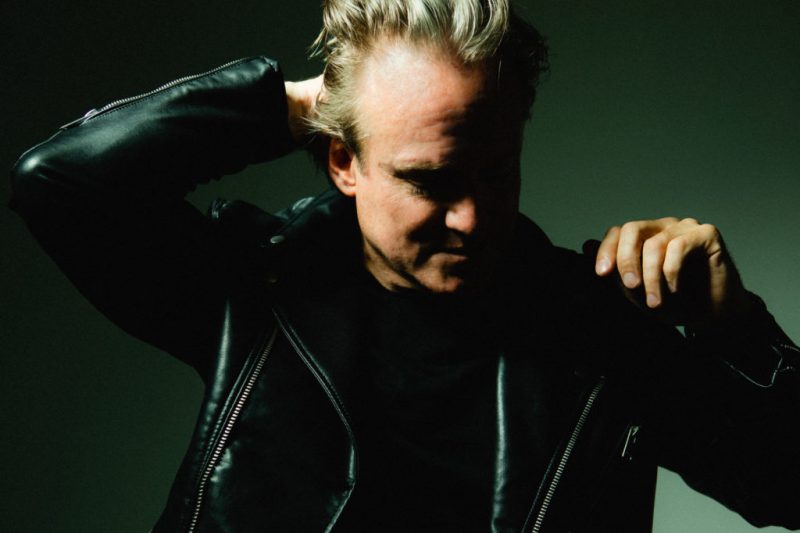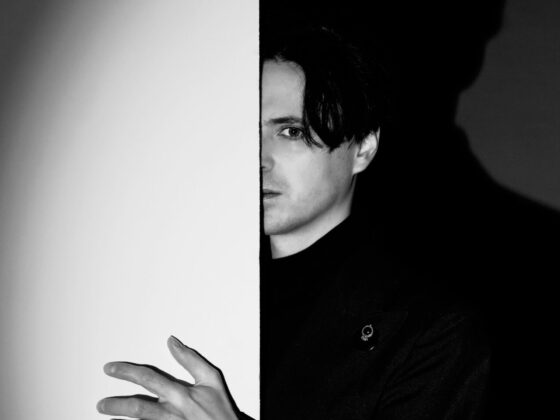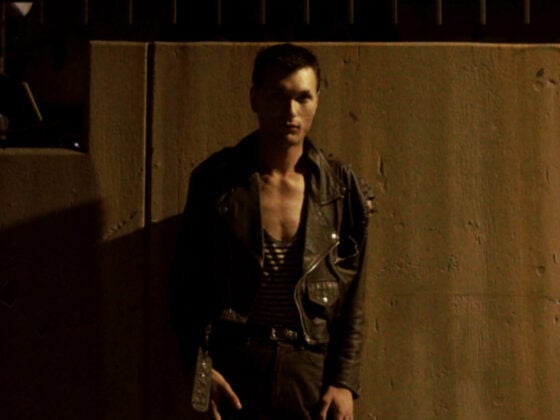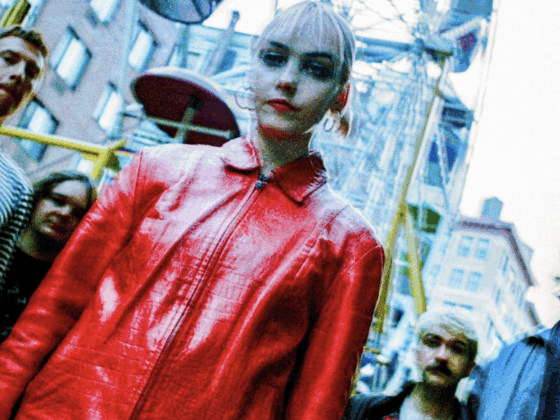One of the biggest surprise releases of 2021 was Aeon Station‘s Observatory. With its clear, sky blue cover depicting a building in mid-construction, the sleeve reflects a rebuilding of sorts. The band, for those not in the know, features 3/4s of early 2000s indie darlings The Wrens. It’s been documented countless times elsewhere, but Aeon Station was forged from the ashes of the band, a reaction to over a decade of misfires and music left sitting in abandonment as The Wrens attempted to follow up their unexpectedly successful third record, The Meadowlands. At the time of its release in 2003, The Meadowlands seemed to deliver on all of the missed opportunities that plagued the band over the years, including the often referenced story of Wind-up Records, known simply as Grass Records at the time, dropping the young, talented, and headstrong New Jersey band and instead focusing all their efforts on, dare we say their name here, Creed.
The Meadowlands finally put the eclectic and eccentric power-pop/post-punk/indie rock band on the map, but as the years went on, the reality of a follow-up became more of a distant memory and a sadly forlorn promise. While The Wrens toured for several years after, perfectionism and life got in the way and any material that was recorded was inevitably shelved or tinkered with into oblivion. Guitarist and co-vocalist Charles Bissell was dissatisfied with most of his own material, while co-vocalist/songwriter and bassist Kevin Whelan felt that his songs were the best he’d written in ages. A real catch-22, if you will…
After 18 years and a series of professional and personal ups-and-downs, Whelan felt it was time to finally put his best foot forward, enlisting his other two Wrens brethren (guitarist and brother Greg Whelan and drummer Jerry MacDonald) and wife Mary Ann Coronel Whelan to complete a series of ten tracks and push forward under a new moniker. As such, Observatory features a handful of songs that were destined for the fourth Wrens record as well as a series of new tracks written by Whelan in a quick flurry of inspiration. In short, it’s a beautiful record, quiet and reflective in spots, and explosive and vital as anything that came before in others. Lead single “Queens” burst forward with a manic dose of anthemic energy, as driving and powerful as anything The Wrens released in their heyday. While the new project may have drudged up some bittersweet feelings between the core songwriting duo, the music truly speaks for itself, a worthy release that builds and finally delivers on years of promise and breathes new life into a scene that was sorely missing music of this caliber and sincerity.
We had the chance to catch up with Kevin Whelan about Aeon Station’s gestation, current and past glories, and finding inspiration in unexpected places.
For the folks at home who might not be familiar with Aeon Station or The Wrens, can you tell us about your journey so far? How did you get to where you are now?
It’s a very lucky journey. You know, everyone has a unique journey in their artistic endeavors. The Wrens essentially started when I was 16 or 17 with just some demos. Out of the blue, I was asked to open for The Fixx, which never happened in the end, but it got me to connect with Charles. As for Jerry, it was my eighth-grade girlfriend, my first girlfriend ever, who was currently going out with this new drummer that I sorta knew in high school. She jokes that it was the worst phone conversation she’s ever taken, but I asked if her boyfriend would be interested in playing drums for us. From then on, Jerry has been a best friend in my life to this day. We were just working on music the other day, even. Of course, there’s also my brother Greg.
So that’s how The Wrens basically started. We were super pumped. We were punk rock, that’s what we loved. You know…fast, hard, angular. We went through a phase where we were writing all these songs that were only a minute long. We thought that was gonna make us famous, right? Like The Ramones, we figured let’s do really, really short songs that just explode. We did that for a number of years, then we moved in with each other in Secaucus, New Jersey, because we didn’t have any money. So many bands do that, it was sort of the rage at the time, because we couldn’t afford a studio. We didn’t have anything. So we just did tons of demos and played the New York circuit. Kenny’s Castaways, Acme, and that scene. People sometimes forget but the whole rage was stuff like Limp Bizkit and Rage Against the Machine. These were the bands that everybody loved, playing indie wasn’t really *in* yet you know?
So you saw yourself as a bit of a reaction to all of that then?
Yeah, I think we played right into it. We signed with Grass and became very close partners with bands like Brainiac in particular – the DC bands like Dismemberment Plan and all those kind of guys. We just started on our journey. We played a lot, A LOT of shows to nobody. Nobody was ever in the audience for years and years. I think we pretty much played to no one maybe for 12 years or so. But we had fun. We enjoyed it. We made the first two Wrens records, Silver and Secaucus, at our house. Then we went on a little bit of a ride, because as you know, we skipped on the million dollar deal. Looking back, it really was crazy. We were 26 and the other guys were in their early 30s, and we didn’t have anything. Little did we know we weren’t gonna have anything for a long time. We made The Meadowlands on our own because nobody was interested. Nobody wanted it whatsoever. Nobody wanted to sign us, nobody wanted to put it out, but our friend put it out, finally. At that point, we’d already been a band for like 13-14 years. Some people who liked our early records now became prominent in certain areas. Even at that point, we still didn’t even have a booking agent. We didn’t have anything. All we had was debt and nobody cared. We had nice reviews, though. We always lucked out with reviews. We kind of lucked out there, because we were always arty and quirky, right? We had power pop and punk influences, but we weren’t in the Green Day school.
After that, we had a really great run with The Meadowlands – we ran with that for about six or seven years because we had to grow the record in Europe and so on. So that took us into the early 2010s, and by that point, wives and kids and family got involved. I don’t think anyone gives you a heads up by how hard your 40s are, you know? I think if you live through your 40s, they’re blindingly complicated. Especially for people in bands that start later in life, we had to navigate that space. Now, sitting here in my early 50s, I just didn’t want to wait anymore to do music. Given COVID and life experiences, the time is gone and you just don’t get it back. So I did the Aeon Station record, and I’m very proud of the music. I’m also very humbled by my experience, just to be able to put it out on Sub Pop and have people listen to it and enjoy it with no great expectations. Just you know, for the love of music.
Thank you for the warning about the 40s. I’m about to hit 40 this year, and it’s been quite an interesting last few years with kids and family and the spaces between…
That’s sort of what this record is about. I have songs specifically on there about divorce. About navigating the feeling of “how did this happen?” and “where did this come from?” That’s what was really of interest to me.
That makes me wonder – how was it to transition between being in a successful band to being a family man, working for Pfizer and Johnson & Johnson, and then back to being a musician again. Was all of this jarring for you, or did you always feel like there was space for music?
I think that’s what’s kind of been touching, with releasing this music is that so many people have artistic endeavors, whether they’re writers, or painters, or dancers or in bands, and it’s about how you fit it into your life. I’ve never not been the guy that has a job and the guy that just does music. So it really wasn’t jarring. Music was always in the mix. Sometimes the volume is raised on something, like right now, it’s really about music. I’ve spent so many years doing a lot of business, and all of this really just coexists. I think if you want to be a generational band, like the ones we’ve seen and lived through, you have to do just that at a certain point in your life. You have to do that when the generation wants you, sort of like when Arcade Fire came around. But if you love music and you love art, and you don’t want to stop doing it, I see no reason to stop.
I’m sort of a case study on how not to have a career in music, but how to continue to play music.
That’s always been my philosophy. I had a job since I was 15. I was never able to take music on the road, to go live in a van for months on end. I probably missed out on some touring experiences because of that, right? Mild regrets, perhaps. However, I always knew that I had to take care of myself and my family because I never had any other choice. But there was always room for music.
I think it’s a bit of an underrated endeavor, you know? Because yeah, if you’re gonna go out and be Dave Grohl, for example, someone who’s just going to jump off the cliff and make a name for himself, he’s going to get those experiences. But there’s only one Dave Grohl in the world, someone that’s that phenomenally talented, that lucky in the space. It’s a real rarity. For the rest of us, for yourself, or what I’m trying to do, we realize that we have to do our jobs because we have to pay rent.
There’s nothing wrong with being practical. Some people seem to think that means you’re not committed, and I don’t think so. It’s a lot to survive out there.
Glad to hear that’s been your experience as well. Thanks for keeping the faith there! With that in mind, how often were you able to work on new material over all these years? I know there were some pieces done with Charles, and other pieces that are more recent. How long did the Aeon Station record take to make overall?
I’ve always been making demos. I mapped out a lot of demos for future Wrens records. I really put my best foot forward at that moment by 2013-2014. I had done all the guitars, all the vocals, the synths, and Jerry played the drums, that kind of stuff. I was finished with all the songs that were gonna go on the record, and then it just sat in a vault, I didn’t do anything, I didn’t touch them, I just would strum guitar to keep active. I actually focused a lot on work, because I was always expecting the Wrens record to come out. Multiple times a year, I was told that it was about to be done and it was going to come out.
So I waited, because The Wrens were the only thing that I’ve ever wanted and the only thing that I’ve ever done. But then when COVID kind of happened and also with my son’s autism, I was like, “you know what? Screw it. I’ve always loved making music. It’s time.” But also, I was scared. Scared to put it out there and worrying about if people are gonna love it or hate it. There’s always going be people that love your work and others that hate it, so it doesn’t really matter in the end.
The other half of the Aeon Station record was written really fast. Within a month or two months, even. It was recorded across three sessions with Tom Beaujour, who is a great friend and great producer.
So while you were living life, working on music, writing material that was meant for The Wrens and became a good part of this new record, what are some of the albums that had an impact on you? Was there anything that came out during this time that reminded you of how good and pure music could be? Anything that inspired you to push forward and keep at it?
I always fail at this because yeah, there was a ton. Gosh, I’ve always liked The Strokes, Muse, The Killers and that kind of things, and I really got into Hot Chip and things like that. Elliott Smith inspired a lot of the ballads over the years. It doesn’t really come through in our music but I really like this band called Catfish and the Bottlemen as well, the singer’s just great. But really just as much anything new, I feel like I was listening to a lot of old Kinks tracks, as weird as that might sound?
Hey, they’re underrated! I feel everyone always talks about the British Invasion as The Beatles vs. The Stones (and maybe The Who), and while The Kinks have a few major classic hits, they just aren’t held up in the same light, which is unfair given how many stone cold classics they have.
Yeah, I went on a bit of a Kinks bonanza and it changed my life. The way they sang, the way it would be so loose and fast. It was certainly a shade of punk rock.
Another band of brothers, by the way!
Yeah! It’s amazing when you listen to these old Kinks songs, especially the ones that aren’t the famous ones. The melodies really stick with you.
My favorite song of theirs is “I’m Not Like Everybody Else” – it’s really quite nasty, isn’t it?
Yeah, I think that I was always trying to do a little bit of that. I also had this weird thing with Elton John recently with the new material. I’ve never been a huge Elton John fan, but I wanted to dig into the lyrics a bit, you know, the Bernie Taupin side of things. So I got this lyric book. This big, long, pretty picture lyric book. And you can see here *holds up book* that I have notes over it. Whether it’s a good thing or a bad thing, I have listened to every Elton John song up to a certain period of his career. It was amazing, seeing these poems laid out. Elton never would change the structure of the poem, wouldn’t add or subtract a single word, and it’s really freaky to know that. As a songwriter, this blew my mind. Stanza after stanza. I also learned that literally within the first 45 seconds of every Elton John song, he’s giving you the the intro, the verse, the connector in the chorus, almost every song, he’s pretty much in within 40 seconds. Weird, right?
I’ve done the same thing with Elton John albums. I’m not a huge fan either, but I liked a couple songs when I was young, so I went back and reassessed things and found lots to love. I do this with every artist that I didn’t like originally or didn’t think was cool when I was an overly serious and dramatic goth kid. I didn’t take as much of a lyrical deep dive as you did, but as a lyric writer (with writers’ block at the moment) that’s really fascinating to hear about the process. It’s hard! I’m a fan of the Bowie/Burroughs cut-up technique where I take one word here, splice in others that don’t quite fit, make it bizarre, and maybe massage it a bit after for clarify and hope for the best!
We lived our career off of that! Throwing things up in two sections, and so on. It’s pretty artful. Funny you mentioned goth stuff by the way, because my wife was listening to Sisters of Mercy recently. I gotta tell you, it was giving me life. Nowadays, I want to hear that kind of driving rock. I remember I was upstairs working and she was listening in the other room, and I was like “what. the. hell IS that?” The bass lead and driving rhythm, and his voice just rolls over. And I was the greatest thing I’ve ever heard. I haven’t really listened to them in forever, you know? I forgot about them, so it felt so fresh in that regard.
Well that brings me to asking about this kind of music in general – what else did you like back in the day? I know you’ve mentioned you like a lot of dreamier stuff on 4AD. I’ve always heard a bit of Pixies in your music, but what else do you pull from?
Oh yeah, Pixies were always a massive influence. When I was a kid I was really into stuff like Bad Brains and 7 Seconds. I grew up in the early 80s when all that stuff was happening. I loved Agent Orange and the like. Then I quickly got into new wave and post-punk, which is pretty much my whole life and all of my major reference points, from Pixies to New Order. You name it, really. Those are the bands that changed everything for me.
I’ve heard a lot of Wire in what you do – which took me a while to put together. When I first heard Silver, I wasn’t aware of them at the time, but I really hear a lot of that manic short, angular energy in your music.
Totally. Wire, Gang of Four, etc. We don’t get this comparison as much, but no question for me, XTC is a massive influence. Silver was our way of trying to capture that XTC mindset. We took the same approach – we weren’t sure we were going to make a record, so we crammed 25 tracks on there. It was straight up as hard as we could. Again, people forget that when we were starting out playing CBGBs and stuff, everybody just wanted to hear that jock, Limp Bizkit kind of stuff, where everyone was just slappin’ da bass, you know?
That must have been so damn challenging.
They hated us. They literally hated us. We would play 50 songs in our set and people just thought it was perverse. They couldn’t stand what we were doing.
I hope this isn’t a difficult question, but I do want to throw it out there. Since Aeon Station is technically 3/4 of The Wrens, do you feel any sort of palpable phantom limb element without Charles there? You wrote so much music together, and some of this album was even meant for the band, was it tough to not have his presence there at all?
If anything, the phantom limb is there to be a strong muscle to make sure that the material is the same quality that we’ve always done. As weird as we were, we were really focused on the quality and making sure everything was as good as ever. We threw out a lot and reworked things, so that was our ethos, if you will. Though I will say that even in The Wrens, we all worked separately, you know, many songs were his, where he would be playing all the guitars and doing all that work. Vice versa for my songs. For me, where we would balance our ideas is in talking to each other and asking if things sucked, if they were good, and what do you think overall? It was more that kind of collaboration for us, and that’s how the band came together. Jerry was the mainstay across all of it, with his drumming.
Look, I’ve only been in one band for over 30 years, it’s really weird to me. Just one! You could be one man in one hundred bands, or you could be one hundred bands in one man. It really It all depends on how you look at it.
So, if you’ll entertain me here, I have a bit of a fun, geographical question. I know that the spirit of Jersey has always run through your work, with Seacaucus, The Meadowlands, and so on. Do you see New Jersey as influencing your sound in any way? Do you consider yourselves a part of the great tradition of Jersey-centric music?
Yes, and I think now we’re so proud of it. Honestly, we were proud of it then, too. When we started, our first gig was playing on the Cape May ferry. We’re SO Jersey that it’s bizarre. We were hideously bad that first night, that’s for sure! But then, you know, we lived on it and we really kind of learned to love where we are, and I think between Philly and New York there’s that Jersey pride in between. We were all huge Springsteen fans. I mean, there’s no two ways around it. We all were. We wanted to emulate the blue collar vibe because that’s who we truly were.. All of us came from hard working families, you know – school teachers, construction workers, and that’s Jersey at its core. So yeah, I’m super glad, now that we’ve done it. We have Secaucus, we have The Meadowlands, and we have our EP, Abbott 1135. That’s an address in Fort Lee. It’s all Jersey.
So I think you touched on this a bit this since you mentioned you all write things separately, but I do want to talk about your process. I hear it in The Wrens and definitely on the Aeon Station record, where there’s say, a solid verse, but then all of a sudden a melody or a motif comes out of nowhere and changes the song dramatically. I’ve always loved the way your music builds but also shifts gears just as easily. What would you say informs that?
I think it’s our bizarre lens of imitating some of our favorite bands. It’s mixed in with all kinds of weird references, things you wouldn’t expect like old Genesis records. I don’t think as a songwriter you take in these references until you sort of just, do it. I think another part of is that we’d just get bored, you know? So it’s part these bizarre references and emulations, our internal boredom as a band, but also just that we never aspired to be one style band in general. We wanted to have diversity in the songs. Here’s something I haven’t really said before, but sometimes it was just jokes, you know? We thought it was funny – what if we try to do this or that? We were trying to piss each other off. What if we put a whole tuba section in here?
That’s what always intrigued me! I remember the first time I heard “What’s a Girl” from Silver and found it to be painstakingly beautiful and emotive, but right at the climax, the tape cuts out and there’s some indistinct chatter about a trailer park. I never knew if that was a mistake or if that was intentional, but it sounds like it was a joke, then!
You know, I remember sitting there with Charles at the control board, and we knew it was a good song, and we were kind of daring each other, egging each other on with it. Do we do it? Do we just mute all the tracks for a second? The funniest part of it was that we thought in our minds, that song was going to be a HIT.
Well hey, it’s my favorite Wrens song, if I had to pick one…
Well, I don’t think it’s going to be on anyone’s hit list, for what it’s worth!
Speaking of hits though, the first time I heard “Queens,” I was gobsmacked. What a track! I think that’s certainly a diamond. How’s the response been to the new music in general?
I’m telling you, after all of these years, to be sitting here with you, it’s mind-blowing. I was only hoping a few people would listen to this, I had no great expectations, but the reception has been so lovely and so kind. What I love too, is that while there’s always been reviews and that’s lovely and appreciated, the best part is when people take this music into their life, that’s the cool stuff. Like the way you mentioned “What’s a Girl” just now. I feel lucky that people respond that way. In short really, I’m humbled and completely freaked out. I’m so glad to hear that people are responding so well.
A well-deserved victory lap! Speaking of “Queens,” your wife Mary Ann sings on that as well, is that right?
Yeah! She sings on “Queens” and “Better Love” and really, it’s been wicked awesome. We’d never had any female vocals on our records before, and I’ve always wanted that timbre. She would say she’s not a singer, but it sounds good to me! You never know, you might want to start recording all your friends and see what happens.
Tell you what, I’m going to start sampling my cat, that’s what I’m gonna do…
Do it!
Last, but not least, assuming all goes well with the pandemic and Omicron, will we see Aeon Station live in the coming months?
I’m definitely going to go out and play. Especially with the reception being where it is. Being of that punk/post-punk tradition, I need to, and we’re really looking forward to it. We’re looking to play in March – to go out, have a good time, and make it good.
With that in mind, Aeon Station will indeed be performing their debut live show on Friday, March 11th at TV Eye in Ridgewood, NYC. The core band will be joined on stage by Lysa Opfer as well as producer Tom Beaujour. Tickets are available now here.
Photos by Ebru Yildiz
















 Or via:
Or via: